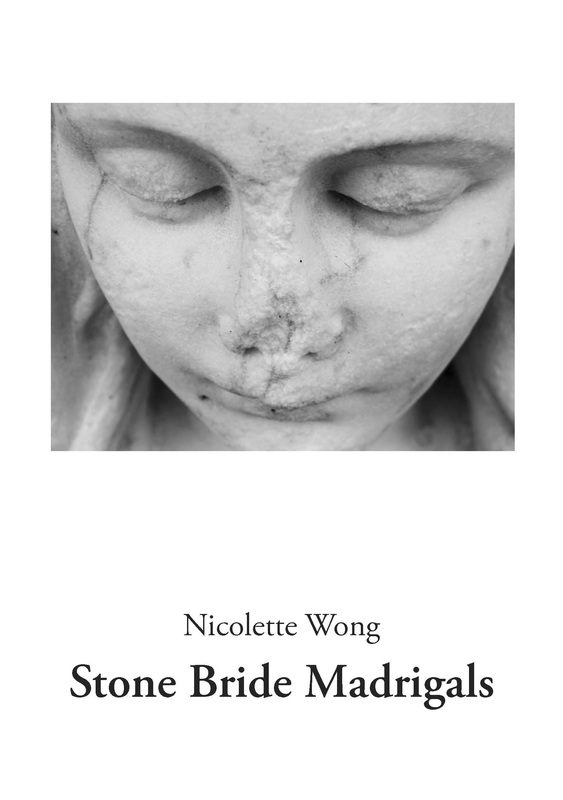|
Review by Greg Bem (@gregbem)
We’ve heard of a space that exists where all things are possible. Where things are contractual by engagement. The whispers of invitations. The shouting of engagement. These words of beckon and repel, these words of concrete concentration, abundant abstraction. Nicolette Wong carries forth, brings forth, urges forward. An undeniable enchantment. A flutter of fandango. The memento of resurrections. It sits, this book, like a tourniquet. Nicolette Wong’s Stone Bridge Madrigals (Corrupt Press, 2013) is a self-actualization we privileged readers have the opportunity to witness. Settings crafted from the tops of pyramids, stories woven, crafted with personas made out of weather patterns, personas born toward flora. The rage and the moment of the drift beyond. Tokens of many shadowed passersby. A deep root of love both rupturing of and growing with history below an earthen surface. Surfaces are how we perceive grounding. Stability. What’s beneath us. That keeps us from sinking, or ensures we are positioned for sight, visions, visages. The tidal waves crashing and cracking all around us. Whip and maneuver of windstorm and the burgeoning words: keep upward, hold right, known beyond gravity, gravitas. There is a vulnerability. There are always the words piercing like darts around us, hailstorm, maelstrom, the woven patterns of violence. Wong writes: “Do not concede to barbed laps. / I will suck up frames, hurl my knees / through chandelier rifles / your open hands.” (From “Skye Well (II)” on page 3.) Imagery of violence, of action: of barrier, boundary, of abuse and entanglement. Reaction and reactivity: the will, strong. Exquisite sense of reclamation. An identification of situation, scenario. The pulse of acting upon the profound, on the entry of a perceived threat, or the exit and the exhibition of the aftermath. To believe that there is the beginning. To believe that there is the moment after the beginning. And that nothing ever finished, that there is always light to allow for forgiving, forbearance, fortuitous lamps allowing for alighting. It is in the lack of or excision of survival. It is in the need for and recognition of a value for a system of experience. This book tells the voices of ethereal and corporeal brides whose lives are beyond initiation, are past performance. Culling the language for zones of reception like scythe to grain stalk. Opening up the vent letting gaseous forms dissipate, forceful flushing. There is blood here. There is texture. There is presence: of woman, of man, of the surreal balance between the two. There is a command in the tension of integrating self with other. There is the grounding close to the surface, and that which is forever away, that which only knowable by its escape of intimacy. How wide is the net cast? In what ways are our identities turned, torqued, transmogrified? Words stepladders of letters, allowing for the eyes to meet a horizon of engagement: breach of wall, triumph over the lip of cliff, ascent up from the watery flush. Words that go beyond song. That go beyond life. Death. Go to a breath, series of beliefs, surrounding and upward, like eyebrows, like urgency. Eleven poems: an elimination of performance, a deserved examination of the rising and falling of world’s beating chest. “The baroque derelict alive / for one last time, reaping feather / flesh with opulent tiles.” (From “The Death Circus” on page 1.) What is natural? What is anthropomorphic? Who are the brides and what are their marriages? A yearning of ritual. A brutal uniting of the staggered masculine and the absorbing feminine. Eleven poems cast a clash, reach an ignition, tame outward understandings of endearment, empathy, a chiseled and graying record, what it means to know, what it means for Wong to have written this space of an acknowledgment in fuchsia and wind spit. A list of additional images, encounters: singes, contortions, barbs; “monuments of my womb”; spilled sand; “last night’s lava”; and wraiths carrying love. A selection. A tremble. A book filled with unsullied spirit, or have I misinterpreted: are these madrigals the songs of the post-sully? Each flip of the page finds a speaker humble though able, at risk but rising beyond horizon, extending view, lungs filled with reconciliation, a mythic questioning of history. To read a series by Nicolette Wong is to consider the close proximity of the poem to the storm, to the grounds of the death of connection, to the moments of the dissipated boundary, to the echo of embodiment and the ceasing of the end of the pattern of scars. To read a series by Nicolette Wong is to join unstoppable worlds and praise the process of revision mastered by those wedded by an impermeable state of being. Through the burning and the bellowing and the billowing and the bearing: a chance to see the sensors of whiskers of knowledge.
0 Comments
Your comment will be posted after it is approved.
Leave a Reply. |
Welcome to Yellow Rabbits. Thanks for visiting.
All reviews by Greg Bem unless marked otherwise.
SearchYellow Rabbits Reviews
Archives by Month
August 2019
|

